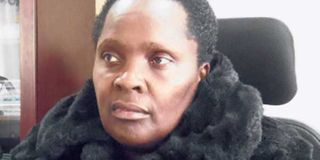Fear of poverty is what drives me

Writing is proof that I am alive as an academic. As a journal reviewer, I contribute by improving articles before they are published. Research scientists are important for development. PHOTO | NATION
What you need to know:
- I was born in a large family to a father who struggled to educate us. He never accepted a class position beyond third; anything else meant serious caning. What could be a better motivator beyond poverty and its associated problems?
- I have had very many stumbling blocks thrown my way and suffered serious resource limitations and betrayals... really nothing that is not common to many. In such cases, I have had to remain focused, with a firm resolve to achieve my goals.
Q: What drives you?
A: I was born in a large family to a father who struggled to educate us.
With no commensurate resources, that was no mean task for him. I learned to work hard and to focus from a young age.
He never accepted a class position beyond third; anything else meant serious caning. What could be a better motivator beyond poverty and its associated problems?
You have been published in peer reviewed journals, what is this one thing you love about writing?
There is an old adage publish or perish. Writing is proof that I am alive as an academic. As a journal reviewer, I contribute by improving articles before they are published. Research scientists are important for development.
We can use research findings disseminated in journals for development. Developed countries have built strong industrial or techno parks that are now the foundation of their economies. If we emulate them, we can attain Vision 2030 sooner.
Maasai Mara University has entered into an MoU with a Chinese institution to develop herbal medicine. Tell us more
A university is universal in all operations and must work or link up with other institutions around the world.
These links help in training of staff and students, besides exposing both parties to global issues. Yes, we have entered into an MoU with an institution in China, but not for herbal medicine as understood by many.
The MoU is about students and staff exchange, joint research and publications among others. Herbal medicine could be one area of research where the University needs to build capacity. We expect our collaborators around here early next year for some seminars.
What has your journey been like?
I have moved to where I am by the grace of God. I know that He is leading me to greater heights that He alone knows and it will be evident to all.
I have had very many stumbling blocks thrown my way and suffered serious resource limitations and betrayals... really nothing that is not common to many. In such cases, I have had to remain focused, with a firm resolve to achieve my goals.
You have done many studies on nutrition. Why the interest?
Nutrition is core to development. Among world indicators of development are the “under-five” (less than five years old) and maternal mortality rates. A malnourished woman is most likely to have malnourished offspring, who will not be productive.
It is a spiral effect that must be broken through targeted intervention measures. This means that maternal and child malnutrition hinder development as limited resources are spent on caring for sick people and not on development.
It is common knowledge that this problem is more common in sub-Saharan Africa, hence my interest in nutrition.
You are an official of the Forum for African Women Educationalists. What plans does the organisation have on education and gender equality?
Most of the world’s illiterate children are in sub-Saharan Africa. Most of the world’s illiterate adults are here as well, and so are those who drop out of school. We cannot compete globally under these circumstances! Fawe continues to provide support for the under-privileged to improve their status. But we need funding for this.
Outside academia, who is Prof Walingo? And, tell me, can family be divorced from academics?
Wife, mother, grandmother, mother-in-law, sister and aunt. I am a serious Christian as well, not an armchair one! And no, one can’t divorce family from academics.
What do you make of education in Kenya today?
The education landscape is changing very fast; there is a huge demand for education but very limited capacity and facilities.
Maasai Mara University has been in the news for frequent strikes...
Strikes have not happened in Masaai Mara alone. I have good students and staff. However, management requires dialogue. We have adopted the problem-solving approach, teamwork, and honesty. We have many challenges but our students have matured and are a force to reckon with. I urge employers to seek Masaai Mara graduates; they are the best.
Which academic figure do you most admire, and why?
Alfred Sommer he is a prominent American ophthalmologist and epidemiologist at the Johns Hopkins Bloomberg School of Public Health who has done extensive work on Vitamin A.
What is your favourite book?
The Holy Bible.
What is the biggest lesson you learnt from your parents?
They taught me to be humble, resilient and determined.
You are a busy woman. Do you create time to cook for your family?
I am a good cook; I love cooking And I’m not bragging. I am fond of beef and chicken dishes.




